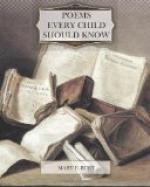Saw the rainbow in the heaven,
In the eastern sky, the rainbow,
Whispered, “What is
that, Nokomis?”
And the good Nokomis answered:
“Tis the heaven of flowers
you see there;
All the wild-flowers of the
forest,
All the lilies of the prairie,
When on earth they fade and
perish,
Blossom in that heaven above
us.”
When he heard the owls at
midnight,
Hooting, laughing in the forest,
“What is that?” he cried,
in terror;
“What is that,” he said,
“Nokomis?”
And the good Nokomis answered:
“That is but the owl and owlet,
Talking in their native language,
Talking, scolding at each
other.”
Then the little Hiawatha
Learned of every bird its
language,
Learned their names and all
their secrets,
How they built their nests
in summer,
Where they hid themselves
in winter,
Talked with them whene’er
he met them,
Called them “Hiawatha’s
Chickens.”
Of all beasts he learned the
language,
Learned their names and all
their secrets,
How the beavers built their
lodges,
Where the squirrels hid their
acorns,
How the reindeer ran so swiftly,
Why the rabbit was so timid,
Talked with them whene’er
he met them,
Called them “Hiawatha’s
Brothers.”
HENRY W. LONGFELLOW.
I WANDERED LONELY AS A CLOUD.
“The Daffodil” is here out of compliment
to a splendid school and a splendid teacher at Poughkeepsie.
I found the pupils learning the poem, the teacher
having placed a bunch of daffodils in a vase before
them.
It was a charming lesson. (1770-96.)
I wandered lonely as a cloud
That floats on
high o’er vales and hills,
When all at once I saw a crowd,
A host of golden
daffodils:
Beside the lake, beneath the
trees,
Fluttering and dancing in
the breeze.
Continuous as the stars that
shine
And twinkle on
the milky way,
They stretched in never-ending
line
Along the margin
of a bay;
Ten thousand saw I at a glance,
Tossing their heads in sprightly
dance.
The waves beside them danced,
but they
Outdid the sparkling
waves in glee:—
A poet could not but be gay
In such a jocund
company;
I gazed—and gazed—but
little thought
What wealth the show to me
had brought.
For oft, when on my couch
I lie
In vacant or in
pensive mood,
They flash upon that inward
eye
Which is the bliss
of solitude;
And then my heart with pleasure
fills,
And dances with the daffodils.
WILLIAM WORDSWORTH.
JOHN BARLEYCORN.
“John Barleycorn” is a favourite with boys because it pictures a successful struggle. One editor has made a temperance poem of it, mistaking its true intent. The poem is a strong expression of a plow-man’s love for a hardy, food-giving grain which has sprung to life through his efforts. (1759-96.)




